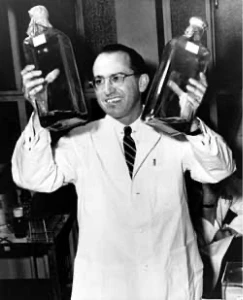
WeWorking the System
By Bill Clifford — CEO, Spencer Trask & Co.
This is the second of a series focused on unicorns whose tusks were shorn once investors and journalists exposed egregious operational malfeasances of messianic leaders who were peddling what turned out to be nothing more than a vision wrapped up in emotion and ‘hot air.’ And in the case of WeWork in particular, a leader who was supported by a cast of employees and customers who functioned more like a fraternity or a cult than anything approaching a business relationship.
. . .
Adam Neumann and Miguel McKelvey started WeWork in 2010 with a breakthrough business model that promised to shake up the market for commercial office space–a multi-billion-dollar industry. Their model was easy to grasp and an attractive product for many early-stage technology companies that were struggling to finance their rapid growth while meeting payroll costs, technology costs, and office rental costs in the sky-high real estate markets of Silicon Valley, New York and Boston, etc. WeWork’s solution was perfect and made short-term leasing a scalable amount of office space accessible to the masses — from independent freelancers to the early teams at GOOP.
WeWork assumed the risk of the long-term lease commitments with startups only committing to short-term rentals for near-term space needs and scaling up or down on that space based on operational growth or decline. Each WeWork location became a “mini-Kibbutz” to harken back to Neumann’s childhood upbringing in Israel. Neumann encouraged Friday afternoon communal beer bashes and lots of fraternization across all WeWork locations to create the sense of one big, happy WeWork family.
JP Morgan Chase, T.Rowe Price, Goldman Sachs Group and others investors had, by 2014, pumped the valuation of WeWork up to $4.6B. Neumann was enjoying trips on the company jet to surfing vacations in exotic locations around the globe while buying buildings and leasing the space back to WeWork at a premium. Among other self-dealings, he also acquired the rights to the ‘We’ trademark only to sell it back to the company for $6M.
While all this buzz about WeWork was happening in the marketplace, the Saudi government was embarking on a program to invest and diversify substantial amounts of its sovereign funds through independent third-party channels into businesses worldwide. The channel that they had chosen to invest these funds in was Softbank, a leading Japanese Venture Capital firm with a long track record of success and led by the renowned Masayoshi Son. As a result of this association, SoftBank created its Vision Fund focused on a ‘300 Year Vision’ of the Future.
Approaching 2017, the mercurial Neumann delivered a passionate pitch to Son during a now infamous 20-minute cab ride; Son agreed that Neumann was on to something big, and his Vision Fund of Softbank invested $4.4B into WeWork–which upped its valuation to $20B.
The money just kept rolling in for WeWork and there seemed to be no end in sight. The company ended FY ’17 having gone through a massive acquisition period and international expansion binge. They entered into Southeast Asia and Brazil, and partnered with Airbnb to encourage business travelers to use WeWork locations while away from their home offices. It also expanded into the workout/gym business with its first WeGym — and there was seemingly no stopping Neumann in his quest to dominate all facets of the human work/life experience. Any business with a complimentary product or service, or a similar model or business focus, was ripe for acquisition.
The acquisitions kept coming: Fieldlens, Spacemob, Unomy, Naked Hub, Embassy, Meetup, LTB (UK), Euclid, Managed by Q, Islands, Prolific Interactive, Teem, Spacious, Designation, Waltz, SpaceIQ, just to name a few. The list seemed endless… but the cracks in the dam began to leak as the company filed for its Initial Public offering as it approached 2019.
Prior to its IPO filing, Softbank had invested another $2B into WeWork (now WeCompany) after launching sister enterprises named WeLive, WeGym, etc. The initial $47B valuation was immediately called into question by analysts and journalists, and the company retracted its S1 filing stating that it looked forward to a “successful initial offering later in 2019 at an offering price in the $10–12B range.”
Unlike Theranos’ CEO Elizabeth Holmes, who at one time was one of the richest women in America with a net worth valued at $4.5B, only to find herself left with essentially zero net worth and facing a prison sentence, Neumann wisely cashed out early and often from the emerging debacle of WeWork.
When the flaws in the WeWork business model became apparent to all the investors and the prospective investing public alike, Softbank took a $9B plus write off on its investment in WeWork and became the primary owner of the company. Neumann agreed to step down as the day-to-day leader of WeWork and turned the reins over to co-CEO’s Artie Minson and Sebastian Gunningham. Rebekah Neumann also stepped down from her executive position at WeWork.
Don’t feel too sorry for the Neumanns — Softbank bought $1B of Adam Neumann’s stock upon his leaving and gave him a $185M consulting contract along with $500K to cover his JP Morgan loan. The company continues to function, albeit in a limited capacity, and has terminated thousands of employees over the past two years.
And yet, for Neumann, life goes on. Following the cash windfall from his WeWork exit, he pivoted to property investment with stakes in a reported 4000 apartment units. Additionally, according to an interview with The Financial Times, he has invested in 49 companies to date through his family fund, which employs more than 50 people.
Why are people and companies continuing to do business with this man?
